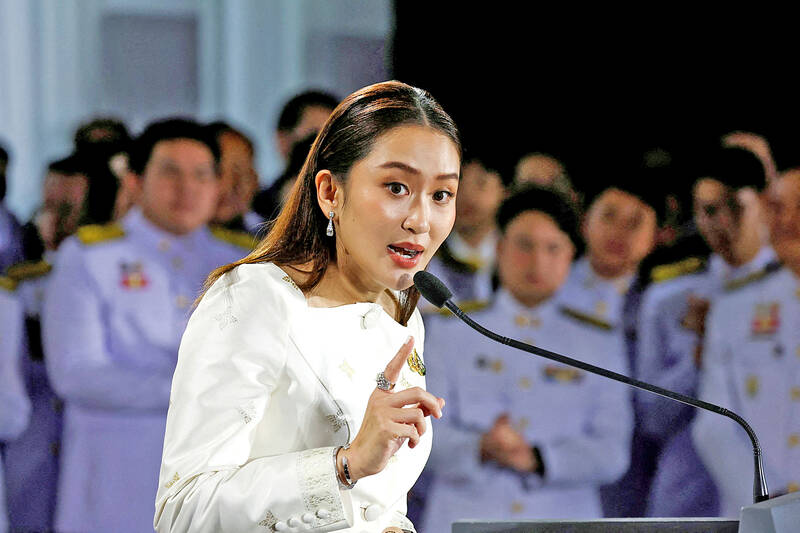Thailand’s new prime minister yesterday named her Cabinet, dumping an influential military-linked party out of government for the first time since 2019.
Thai King Maha Vajiralongkorn officially endorsed the new team of ministers nominated by Thai Prime Minister Paetongtarn Shinawatra of the Pheu Thai Party. She is expected to present her policy platform to parliament next week.
The 38-year-old Paetongtarn, daughter of former Thai prime minister Thaksin Shinawatra, last month was chosen as Thailand’s youngest-ever prime minister after a court ruling ousted her predecessor over an ethics case.

Photo: Reuters
Many of her top ministers are unchanged, but dropped from the ruling coalition is the Palang Pracharath Party (PPRP), led by former army chief and coup-maker Prawit Wongsuwan.
The PPRP was set up as a vehicle for junta leaders to keep power in civilian guise at the 2019 election and led the government until last year’s polls, which brought Pheu Thai to power.
Pheu Thai caused surprise — and consternation among some supporters — when it added PPRP to its governing coalition in August last year.
Prawit was one of the architects of the putsch that ousted Pheu Thai’s last prime minister — Paetongtarn’s aunt Yingluck Shinawatra — in 2014, paving the way for five years of direct military rule. The 79-year-old is under investigation after he was filmed slapping a female journalist as she tried to ask him questions.
Embracing PPRP was seen as a gamble by many because of the party’s links to senior military officers whose hostility to Thaksin and his allies has colored Thai politics for more than 20 years.
Last month was also chaotic as the Thai Constitutional Court dissolved the main opposition Move Forward Party and sacked Srettha Thavisin as prime minister in the space of a week.
Srettha’s ouster paved the way for Paetongtarn to take the top job, but she faces a daunting task with the economy still struggling to bounce back from the COVID-19 pandemic and seasonal floods threatening many of the kingdom’s provinces.

CHIP WAR: The new restrictions are expected to cut off China’s access to Taiwan’s technologies, materials and equipment essential to building AI semiconductors Taiwan has blacklisted Huawei Technologies Co (華為) and Semiconductor Manufacturing International Corp (SMIC, 中芯), dealing another major blow to the two companies spearheading China’s efforts to develop cutting-edge artificial intelligence (AI) chip technologies. The Ministry of Economic Affairs’ International Trade Administration has included Huawei, SMIC and several of their subsidiaries in an update of its so-called strategic high-tech commodities entity list, the latest version on its Web site showed on Saturday. It did not publicly announce the change. Other entities on the list include organizations such as the Taliban and al-Qaeda, as well as companies in China, Iran and elsewhere. Local companies need

CRITICISM: It is generally accepted that the Straits Forum is a CCP ‘united front’ platform, and anyone attending should maintain Taiwan’s dignity, the council said The Mainland Affairs Council (MAC) yesterday said it deeply regrets that former president Ma Ying-jeou (馬英九) echoed the Chinese Communist Party’s (CCP) “one China” principle and “united front” tactics by telling the Straits Forum that Taiwanese yearn for both sides of the Taiwan Strait to move toward “peace” and “integration.” The 17th annual Straits Forum yesterday opened in Xiamen, China, and while the Chinese Nationalist Party’s (KMT) local government heads were absent for the first time in 17 years, Ma attended the forum as “former KMT chairperson” and met with Chinese People’s Political Consultative Conference Chairman Wang Huning (王滬寧). Wang

CROSS-STRAIT: The MAC said it barred the Chinese officials from attending an event, because they failed to provide guarantees that Taiwan would be treated with respect The Mainland Affairs Council (MAC) on Friday night defended its decision to bar Chinese officials and tourism representatives from attending a tourism event in Taipei next month, citing the unsafe conditions for Taiwanese in China. The Taipei International Summer Travel Expo, organized by the Taiwan Tourism Exchange Association, is to run from July 18 to 21. China’s Taiwan Affairs Office spokeswoman Zhu Fenglian (朱鳳蓮) on Friday said that representatives from China’s travel industry were excluded from the expo. The Democratic Progressive Party government is obstructing cross-strait tourism exchange in a vain attempt to ignore the mainstream support for peaceful development

DEFENSE: The US would assist Taiwan in developing a new command and control system, and it would be based on the US-made Link-22, a senior official said The Ministry of National Defense is to propose a special budget to replace the military’s currently fielded command and control system, bolster defensive resilience and acquire more attack drones, a senior defense official said yesterday. The budget would be presented to the legislature in August, the source said on condition of anonymity. Taiwan’s decade-old Syun An (迅安, “Swift Security”) command and control system is a derivative of Lockheed Martin’s Link-16 developed under Washington’s auspices, they said. The Syun An system is difficult to operate, increasingly obsolete and has unresolved problems related to integrating disparate tactical data across the three branches of the military,